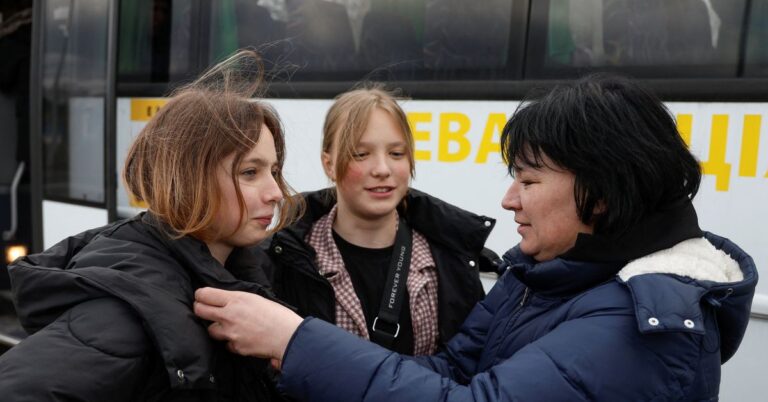UKRAINE/BELARUS BORDER, April 8 (Reuters) – More than 30 children were reunited with their families in Ukraine this weekend after a lengthy operation to bring them home from Russia or Russian-occupied Crimea, where they were brought from which was occupied by the Russian forces during the war.
Mothers hug sons and daughters as they cross the border from Belarus into Ukraine on Friday after a complex rescue mission that involved traveling across four countries.
Dasha Rakk, a 13-year-old girl, said she and her twin sister agreed to leave the Russian-occupied city of Kherson last year because of the war and go to a holiday camp in Crimea for a few weeks. But once in Crimea, Russian officials said the children would stay longer.
“They said, let’s adopt, we’ll get guardians,” she said. “When they first told us we were going to take a long time we all started crying.”
Dasha’s mother Natalia said she traveled from Ukraine to Crimea via Poland, Belarus and Moscow to pick up her daughters. Ukraine’s Crimea peninsula has been occupied by Russia since 2014.
“It was very difficult but we continued, we didn’t sleep at night, we slept sitting up,” he said, describing his journey to the camp.
“It’s heartbreaking to see the children left crying behind the fence,” she said.
Kyiv estimates that nearly 19,500 children have been taken to Russia or Russian-occupied Crimea since Moscow invaded in February last year, in what it condemned as illegal deportations.
Moscow, which controls parts of eastern and southern Ukraine, has denied abducting the children and said they were taken away for their own safety.
“Today the fifth rescue mission is about to end. It is special in terms of the number of children we managed to return and also because of its complexity,” said Mykola Kuleba, the founder of the Save Ukraine humanitarian organization that helped organize the rescue mission.
Kuleba told a briefing in Kyiv on Saturday that all 31 children who were brought home said no one in Russia was trying to find their parents.
“There are children who have changed their location five times in five months, some children say they are living off rats and cockroaches,” he said. The children were brought to what the Russians call stay-at-home summer camps from occupied parts of Ukraine’s Kharkiv and Kherson regions, Kuleba said.
[1/19] Natalia Rakk spoke to her 14-year-old daughters Dasha and Aliona, who went to a Russian-organized summer camp from non-government-controlled territories and were then brought to Russia, after return to the Ukraine-Belarus border in the Volyn region, Ukraine April 7, 2023. REUTERS/Valentyn Ogirenko
The Russian Foreign Ministry did not immediately respond to a request for comment.
ARREST WARRANTS
Three children – two boys and a girl – were present at the media briefing in Kyiv. Save Ukraine said they returned home on a previous mission last month that returned 18 children in total.
The three said they were separated from their parents after Russian authorities forced them to send their children to Russian summer camps for what was billed as two weeks, from occupied parts of Kherson and Kharkiv regions.
The children told the briefing that they were forced to stay in summer camps for four to six months and were moved from one place to another during their stay.
“We were treated like animals. We were locked in a separate building,” said Vitaly, a child from the Kherson region whose age was unclear. He added, they were told that their parents no longer wanted them.
The International Criminal Court last month issued arrest warrants for Russian President Vladimir Putin and Russia’s children’s rights commissioner, Maria Lvova-Belova, accusing them of abducting children from Ukraine.
Moscow has not hidden a program in which it took thousands of Ukrainian children from occupied areas, but has presented it as a humanitarian campaign to protect orphans and children abandoned in the conflict zone.
Russia has rejected the allegations at the ICC, saying it does not recognize the court’s jurisdiction and calling the warrants null and void.
Lvova-Belova said earlier this week that her commission acted on humanitarian grounds to protect the interests of children in an area where military action was taking place and that no one had been moved against their will or their parents or legal guardians, whose consent is always sought unless they are missing.
Kateryna Rashevska, a lawyer from a Ukrainian NGO called the Regional Center for Human Rights, told the briefing that they were collecting evidence to build a case that Russian officials deliberately prevented the return of Ukrainian children .
“In every story there is a whole range of international violations and it cannot go unpunished,” he said.
Additional reporting by Olena Harmash Editing by Tom Balmforth, David Ljunggren and Frances Kerry
Our Standards: The Thomson Reuters Trust Principles.
